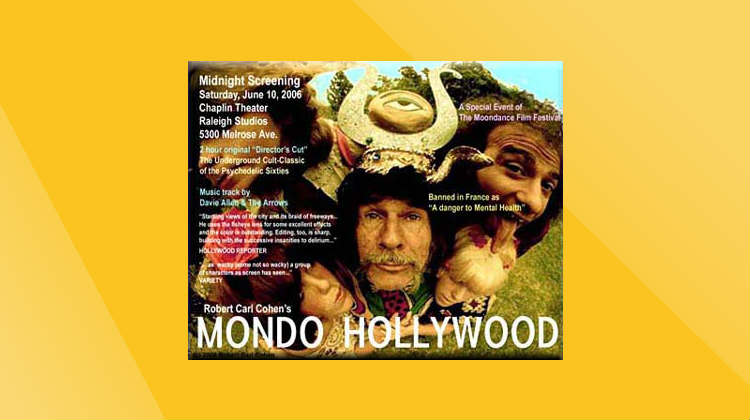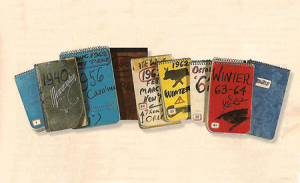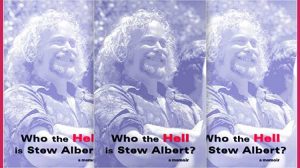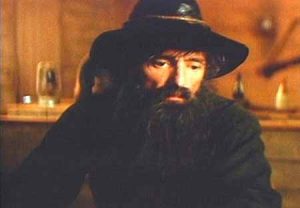
At midnight on June 10, 2006, in a special event for the Moondance Film Festival, The Chaplin Theater (5300 Melrose Ave) in Los Angeles will be presenting the digitally-enhanced Director’s cut of Mondo Hollywood. Written, produced, directed and edited by Robert Carl Cohen — renowned for his pioneering documentary films INSIDE RED CHINA, INSIDE EAST GERMANY, THREE CUBANS, and COMMITTEE ON UNAMERICAN ACTIVITIES.
Long considered a cult classic, Mondo Hollywood captures the underside of Hollywood by documenting a moment in time (1965-67), when an inquisitive trust in the unknown was paramount, hope for the future was tangible and life was worth living on the fringe. Musical Direction by Mike Curb — later elected Lt. Governor of California (1978), despite being falsely accused of “singing falsetto in a bathtub scene in the film with two lesbians.” The sound track is performed by Davy Allen & The Arrows along with The Mugwumps (including Mama Cass and Zal Zablonsky).
Related in name only to the foreign-made exploitation films with similar titles: Mondo Cane (“Dog’s World”) and Mondo Pazzo (“Crazy World”), Mondo Hollywood, is about the minds and lives of a few of the more “outsider” personalities who made up the Hollywood counter-culture of the mid-1960s. An interior monologue narrative approach is used throughout the film, where each principal person shown not only decided on what they wanted to be filmed doing, but also narrated their own scenes. “Life actors” living in the moment and trusting in their own visions.
The film opens with Gypsy Boots (the original hippie vegan — desert hopping blender salesman), and stripper Jennie Lee, working out “Watusi-style” beneath the “Hollywood” sign — leading into the “sustainable community” insight of Lewis Beach Marvin III, the S&H Green Stamp heir, who lived in a $10 a month garage while owning a mountain retreat in Malibu. Close-ups and cameo vignettes include: Frank Zappa and members of the Mothers of Invention, Carl Franzoni, Bobby Beausoleil of the “Manson Family,” imprisoned for life for murder, and Jay Sebring – a victim of the Mansons, Elizabeth Taylor, Richard Burton, Silent Screen Star; Helen White, Sean Connery, Brigitte Bardot, Alfred Hitchcock, Ronald Reagan, L.S.D. advocate; Dr. Richard Alpert, Jayne Mansfield, and Rudi Gernreich, creator of the topless fad.
In retrospect, the unwarranted reactions against the film by authoritarians, ranging from the French Commission of Control to the CIA (which labeled it, along with all of Cohen’s other films, as “pro-communist”) indicate Mondo Hollywood had struck a nerve – and questioned myths that seemed essential to those who attempted to control our minds. Invited to open the 1968 Avignon & Venice Film Festivals, but banned by the French Ministry of Information as a “danger to mental health” as well as an “apology for certain perversities, including drugs and homosexuality.” Originally denounced as a “bizarre prophecy” by the critics, today the film reveals itself to be far more prophetic than “bizarre.” For instance, one of the film’s “freakiest” subjects — artist-dancer (and future Cotati, Ca. City Councilman), Vito Paulekas, appearing with his wife Sue and late son Godo, astutely points out that the pharmaceutical industry might well be creating the “drug problem.” As for the “perversities,” depicted or described in the film, they would have to be the ones perpetrated by the likes of then President Lyndon B. Johnson and California Governor Ronald Reagan.
The film was also described by UNESCO social scientist S. Friedman as “…a vivid, warm & humorous image of people confronting the eternal American dream. It may well be that we are at the eve of a profound social and moral revolution.” Upon revisiting Mondo Hollywood in 2006 this assessment is remarkably correct.




Leave a Reply